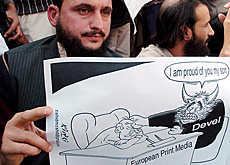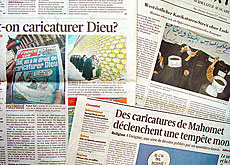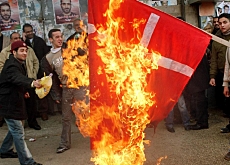A case to answer over Mohammed cartoons?

Legal opinion in Switzerland is divided over whether publication of the controversial Mohammed cartoons constitutes a breach of Swiss law.
Under article 261 of the criminal code, anyone who “openly and in a vile way” insults or derides the religious beliefs of others can be jailed for up to six months or fined.
In neighbouring France a court on Tuesday rejected an attempt by Muslim groups to stop the magazine Charlie Hebdo publishing the cartoons that originally appeared in a Danish newspaper last year.
They argued that publication of the cartoons – including one that shows Mohammed with a bomb-shaped turban – would amount to an insult to their religion. But the suit was dismissed on a technicality.
Although there have been calls in Switzerland for boycotts of newspapers that have reprinted the cartoons, no one has yet brought a case in the courts.
But Daniel Häusermann, of the Research Center for Information Law at St Gallen University, believes they would stand a good chance of winning a conviction if they did.
“There is quite a strong case for saying that some of the depictions of Mohammed are an insult to Muslims,” Häusermann, who is a researcher at the unit, told swissinfo.
“Swiss legal doctrine isn’t very clear on how serious an insult has to be, but a frequent test is whether the average member of a religion believes that his or her feelings are seriously violated by these cartoons.
“If the answer is ‘yes’, then there’s a good chance someone will be convicted for publishing these cartoons.”
Legal precedent
Häusermann said, however, that relatively few cases were brought under article 261, making it difficult to predict what would happen.
He suggested that one point of reference might be a case in 1971 when the Swiss tabloid Blick printed a painting showing a Walt Disney pig in the manner of Christ on the cross and the editor was punished. But he admitted that attitudes to religion had changed since then.
Even so, he said there had been a number of cases resulting in convictions where the feelings of Christians had been violated by artwork or press satire.
“The key point is that there is no doubt that Mohammed was depicted in a negative way, associated with terrorism and violent extremism, and because of that there’s a strong case for saying this violates the religious feelings of the average member of the Muslim community,” said Häusermann.
But Geneva lawyer Charles Poncet, a specialist in media law, sees the situation in a very different legal light.
He told swissinfo that the requirements of a criminal offence were “just not there”. He said article 261 referred to someone, for example, caught defecating in a chapel or representing Christ committing a sex act.
“There’s no way that a sketch of some guy, supposedly the holy Prophet, with a bomb in his hat, would qualify as a crime under [article] 261,” he said.
Tackle the issue
But Poncet said he would welcome the Muslim community in Switzerland bringing a case, since it would show that Muslims were willing to tackle the issue in a considered and measured way.
He agreed with Häusermann that there was a lack of case law on the subject, but said the key to any prosecution under article 261 was whether the cartoons had caused offence “in a vile way”.
He said legal commentators were unanimous in saying that this did not refer to humorous or satirical attacks “which may or may not drive the victims to madness”.
“Referring to the main offence here, which is the Prophet’s hat with a bomb in it, that’s not vile – period,” said Poncet. “The fact that it causes havoc is not a requirement – it’s a factor but it doesn’t make it an offence just because people are mad at it.”
“Guessing what a court will or might do is always a very dangerous game but I would be very, very surprised if any of these drawings would produce a guilty verdict of any kind in a Swiss court,” he added.
Häusermann agreed that the “in a vile way” clause would be the clincher for any trial, adding that this would likely be the main focus for any defence lawyer.
swissinfo, Adam Beaumont in Geneva
Publication of the controversial Mohammed cartoons in Switzerland has prompted calls in Geneva for a boycott of the Tribune de Genève.
Muslim academic Fawzia Al-Ashmawi says the caricatures are a gross insult to Islam and has demanded an apology. But she told swissinfo that she would not bring a suit against the newspaper.
On Friday the Swiss Press Council said newspapers could print the Mohammed cartoons to help explain the furore surrounding their publication.
Relevant part of article 261 of the criminal code:
“Whosoever openly and in a vile way insults or derides the beliefs of others in matters of faith, in particular the belief in God, or profanes objects of religious worship… will be subject to a prison sentence of up to six months or a fine.”

In compliance with the JTI standards
More: SWI swissinfo.ch certified by the Journalism Trust Initiative



You can find an overview of ongoing debates with our journalists here. Please join us!
If you want to start a conversation about a topic raised in this article or want to report factual errors, email us at english@swissinfo.ch.